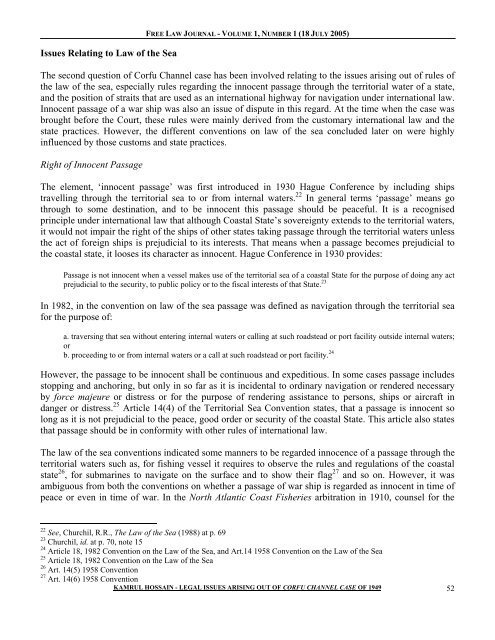Free_Law_Journal-Vol.. - Free World Publishing Inc.
Free_Law_Journal-Vol.. - Free World Publishing Inc.
Free_Law_Journal-Vol.. - Free World Publishing Inc.
You also want an ePaper? Increase the reach of your titles
YUMPU automatically turns print PDFs into web optimized ePapers that Google loves.
Issues Relating to <strong>Law</strong> of the Sea<br />
FREE LAW JOURNAL - VOLUME 1, NUMBER 1 (18 JULY 2005)<br />
The second question of Corfu Channel case has been involved relating to the issues arising out of rules of<br />
the law of the sea, especially rules regarding the innocent passage through the territorial water of a state,<br />
and the position of straits that are used as an international highway for navigation under international law.<br />
Innocent passage of a war ship was also an issue of dispute in this regard. At the time when the case was<br />
brought before the Court, these rules were mainly derived from the customary international law and the<br />
state practices. However, the different conventions on law of the sea concluded later on were highly<br />
influenced by those customs and state practices.<br />
Right of Innocent Passage<br />
The element, ‘innocent passage’ was first introduced in 1930 Hague Conference by including ships<br />
travelling through the territorial sea to or from internal waters. 22 In general terms ‘passage’ means go<br />
through to some destination, and to be innocent this passage should be peaceful. It is a recognised<br />
principle under international law that although Coastal State’s sovereignty extends to the territorial waters,<br />
it would not impair the right of the ships of other states taking passage through the territorial waters unless<br />
the act of foreign ships is prejudicial to its interests. That means when a passage becomes prejudicial to<br />
the coastal state, it looses its character as innocent. Hague Conference in 1930 provides:<br />
Passage is not innocent when a vessel makes use of the territorial sea of a coastal State for the purpose of doing any act<br />
prejudicial to the security, to public policy or to the fiscal interests of that State. 23<br />
In 1982, in the convention on law of the sea passage was defined as navigation through the territorial sea<br />
for the purpose of:<br />
a. traversing that sea without entering internal waters or calling at such roadstead or port facility outside internal waters;<br />
or<br />
b. proceeding to or from internal waters or a call at such roadstead or port facility. 24<br />
However, the passage to be innocent shall be continuous and expeditious. In some cases passage includes<br />
stopping and anchoring, but only in so far as it is incidental to ordinary navigation or rendered necessary<br />
by force majeure or distress or for the purpose of rendering assistance to persons, ships or aircraft in<br />
danger or distress. 25 Article 14(4) of the Territorial Sea Convention states, that a passage is innocent so<br />
long as it is not prejudicial to the peace, good order or security of the coastal State. This article also states<br />
that passage should be in conformity with other rules of international law.<br />
The law of the sea conventions indicated some manners to be regarded innocence of a passage through the<br />
territorial waters such as, for fishing vessel it requires to observe the rules and regulations of the coastal<br />
state 26 , for submarines to navigate on the surface and to show their flag 27 and so on. However, it was<br />
ambiguous from both the conventions on whether a passage of war ship is regarded as innocent in time of<br />
peace or even in time of war. In the North Atlantic Coast Fisheries arbitration in 1910, counsel for the<br />
22 See, Churchil, R.R., The <strong>Law</strong> of the Sea (1988) at p. 69<br />
23 Churchil, id. at p. 70, note 15<br />
24 Article 18, 1982 Convention on the <strong>Law</strong> of the Sea, and Art.14 1958 Convention on the <strong>Law</strong> of the Sea<br />
25 Article 18, 1982 Convention on the <strong>Law</strong> of the Sea<br />
26 Art. 14(5) 1958 Convention<br />
27 Art. 14(6) 1958 Convention<br />
KAMRUL HOSSAIN - LEGAL ISSUES ARISING OUT OF CORFU CHANNEL CASE OF 1949 52
















